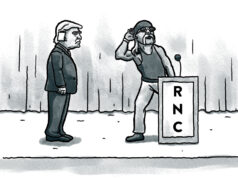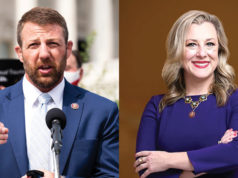
Last week, it was Mark Zuckerberg’s time in the barrel. Facebook and Co. are getting their social media comeuppance. Even super geek Elon Musk was dropping Facebook, at least for his Tesla and SpaceX company pages.
Facebook apparently has a problem with “transparency” regarding political ads. The big scandal was that Facebook was a little too transparent by allowing its users’ private information to get into the hands of data miner Cambridge Analytica, potentially to the political benefit of Donald Trump.
Much like a one-way mirror at the police station, I’d call it “alternative transparency.”
And then the second shoe dropped: The Cambridge outfit was exposed when CEO Alexander Nix was caught on hidden video. If you haven’t seen it, it’s posted at the top of this article. In it, the CEO admits to pulling every dirty trick in the book – from spreading propaganda to creating false news stories to implementing honey pots to creating fake bribery schemes – all to ensure victory for his patrons. He further explains the rationale behind Cambridge Analytica’s misuse of social media: Voters were irrational. Cambridge Analytica could use personal data to identify fears that are unknown even to the people themselves. In turn, the company could manipulate those fears and take hapless users “deeper down the well.”
Add some Mercer money, Steve Bannon, a few Ph.D.s, some Russian spies, social media bots with millions of fake user IDs, and we have the secret sauce in the dressing to make a brain salad guaranteed to give computer users dysentery of the id.
An unholy encounter with fake news
All this reminds me of Election Day 2016. While I was perusing the news on the ‘Net, I saw the dangle: “Pope Endorses Trump.”
Since few news sites actually report the news, I followed the link to its originating “news” site, and there it was: “Pope … blah … Trump … blah … endorsement.” It was just enough to tweak me. The new Pope seemed to be a reformer, an almost-liberal. Earlier in the campaign, didn’t Pope Francis even suggest that then-candidate Donald Trump was not Christian?
I was so discouraged, I thought that I might not vote. Because it probably was true: No one would lie about the Pope, particularly to advance a presidential candidate. Both institutions were just too sacred, right?
Well, after stewing and ranting, going from site to site trying to confirm the “news,” I finally went to Snopes. It was a lie, plain and simple.
The Pope story was just one of many politically motivated disinformation campaigns. Take the numerous Hillary Clinton conspiracy stories — they were only silly annoyances to me, too stupid to be believed. Those stories, however, continued for months after the election, to reinforce and remind us, I suppose, of how much we hate Hillary, and that, as bad and as terrible and as awful as Trump is (and he is), we would be far worse with Hill’ (no, we wouldn’t).
Extent of such villainy remains unknowable
So, last week the press reported a big scandal about people’s stolen Facebook data, but the unattributed lies posing as real news, which go unchallenged on social media and throughout the Internet, form a far bigger scandal. It’s deep-pocket manipulation via data mongers who know more about us than we do about ourselves.
Other than a snip about Cambridge, we have no idea who these people are and the extent of their villainy. Their handiwork just appears and disappears into vapor.
So much for “transparency.”




















